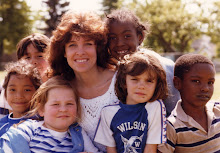 Most young kids come to school eager to read and write and learn. If all goes well, teachers tap into the knowledge that kids have developed during their first years of life--about literacy and the world in general--and provide the rich experiences that launch these fledgling learners into the world of schooling.
Most young kids come to school eager to read and write and learn. If all goes well, teachers tap into the knowledge that kids have developed during their first years of life--about literacy and the world in general--and provide the rich experiences that launch these fledgling learners into the world of schooling.But we all know kids that haven't connected easily with school, and the reasons vary. Do you recognize stories like these?
1. Scott was a kid who struggled with the simplistic reading books used in his first grade classroom, yet loved planes and would sketch jets and browse books about them by the hour. He came to my multi-age primary classroom as a second grader, and a beginning reader who had few literacy skills. He lacked confidence as a learner in school.
2. Tyler was reading when he started kindergarten, and there was a clear mismatch between the curriculum that focused on learning letters and sounds and his literacy skills. His teacher viewed kindergarten as a place to teach beginning readers and said she wasn't able to teach him within that context. A year later, he entered a 1st-3rd grade multi-age classroom as one of the youngest students, as a very experienced reader, yet disengaged from school.
3. Anne was the mother of a quiet and deliberative six-year old daughter. Anne volunteered in the classroom twice a week, and was unsure if her daughter was on target as a first grader. What could help her know?
4. Phil was a business owner who reported that he struggled to read the materials that could help him advance his work. His perceptions of himself as a reader were shaped in his first years of school, and were further defined by being the only sibling in his family without a college degree. His view of his reading skills was a mismatch with the thoughtful adult I spoke with who reads the New Yorker for enjoyment.
5. Nick was entering the fourth grade reading like a beginning reader. Based on the school's recommendation he had attended two years of remedial tutoring and summer school. Although he was bright in many ways, his literacy skills had not developed despite the suggested help. It was getting harder and harder for his mother to get him up for school.
This blog is dedicated to ending the frustration that kids and families feel when there's a mismatch between kids' learning and the experience of school. This forum allows us to think through the issues and to problem solve together.
Learners "struggle" for a reason. The reason usually becomes clear when we spend time with them and pay close attention. The problem is rarely that there is something wrong with a reader. Usually, they become confused about reading, often because of their experiences in learning to read and write. Clearing up their confusions is the first step toward successful learning.
One final point: I haven't found it helpful to label children. Referring to learners as lazy or learning disabled or at-risk (the latter two relate to funding categories) hasn't been helpful to me in teaching children to read. What we can do instead is listen to children and learn from them. I am committed to helping you do the same, whether you are the parent, grandparent, teacher, or foster parent of a kid whose learning is not yet on track.




Kathy,
ReplyDeleteOur six year-old daughter, Rose, is a first grader in a private school. We have been quite happy with the school for the last couple of years. Recently, however, we have become concerned that she is being given few opportunities to read aloud to the teacher, or with her classmates. In addition, the students are not writing, except for one journal entry per week. They also are not learning about great books, and the techniques used by these authors.
We have read to Rose virtually every day since she was born, and my husband and I are avid readers. We sense, however, that Rose does not feel confident about reading, and is not reading as well as she could. She is interested in books though and in the world around her.
We want to do all we can at home to rectify this situation in a way that does not pressure her to succeed. She has always been open to new ideas and activities. We feel if we can approach this problem with the right tools, and do so with joy, we can solve it. We are not, however, trained to be teachers, and feel a bit inept in this role. We need guidance in developing a strategy as well as specific techniques, books, and other resources, which will allow us to create a situation where Rose can blossom into the great reader and writer we know she can become.
Thanks so much.
Jacqueline